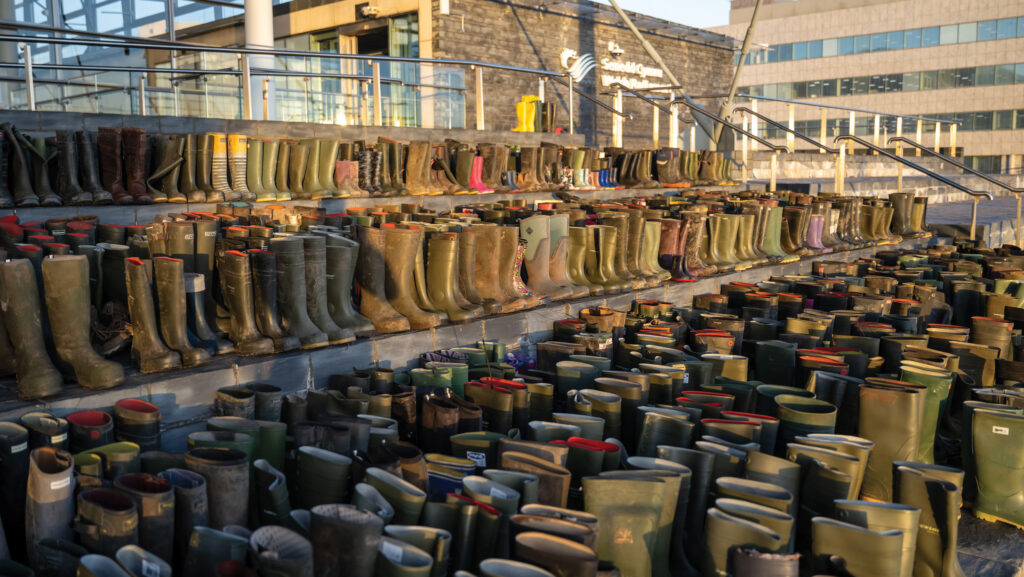Review of the Year 2024: From party time to farmer protests
 © Matthew Horwood/Alamy Stock Photo
© Matthew Horwood/Alamy Stock Photo From celebrations to commiserations – Farmers Weekly takes you through the A-Z of this year’s agricultural highs and lows. In this article, we look at A-G…
See also: Video: 90 & Counting – mixed farmer Robert Scaling, North Yorkshire
A is for “All change please”
The political landscape around agriculture in the UK saw significant shifts at ministerial level in 2024.
In the aftermath of Labour’s general election victory over the Conservatives, there were notable reshuffles at Defra.
Croydon MP Steve Reed was appointed as secretary of state, replacing Steve Barclay, and Cambridge MP Daniel Zeichner replaced Mark Spencer as farming minister.
The Welsh government witnessed significant upheaval too when, in March, Vaughan Gething (formerly first minister) moved Wrexham MS Lesley Griffiths from her long-established rural affairs role to the culture portfolio.
Huw Irranca-Davies was appointed to the newly created post of minister for climate change and rural affairs.
However, in July, Ms Griffiths and three other cabinet members resigned in protest over the leadership qualities of Mr Gething, who subsequently stood down in August.
Mr Gething was succeeded by Baroness Eluned Morgan, who then appointed Mr Irranca-Davies as her deputy, though he retained his rural affairs portfolio.
In February, after a 24-month hiatus, the Northern Ireland Assembly was restored and Andrew Muir was appointed as Department of Agriculture, Environment and Rural Affairs (Daera) farming minister.
Meanwhile, in September, Liberal Democrat MP for Orkney and Shetland Alistair Carmichael was elected as the new Environment, Food and Rural Affairs (Efra) select committee chairman, replacing former Conservative MP Sir Robert Goodwill.
The Efra committee has a long list of topics to investigate.
B is for “Birthday bash”

Farmers Weekly celebrated its 90th birthday in June, having taken the news trade by storm in 1934.
Our special anniversary issue ran to 164 pages, with a bonus 68 pages tagged on the back being a reprint of the original first edition.
Readers were amazed at the similarities (a prominent article from the president of the NFU worried about livestock numbers and food security), and at the differences (a cover price of 2d against the current £4.40).
An 11-page supplement looked at machinery over the years, and introduced our new series “90 and Counting”, in which we speak to farmers born in each of the nine decades since FW’s first issue.
C is for “Crimestoppers”
Farmers across the UK have stepped up efforts to combat rural crime, which cost the sector more than £50m a year, according to NFU Mutual’s 2024 Rural Crime Report.
The report highlighted a troubling 137% surge in GPS equipment theft, valued at £4.2m, alongside increases in livestock and ATV thefts.
However, agricultural vehicle theft costs saw a 9% decline, reflecting some success from preventative measures.
The psychological toll is stark, with 86% of NFU Mutual agents reporting a negative mental health impact on farmers, and 77% observing repeat victimisation.
Farmers are increasingly adopting advanced security measures such as GPS tracking devices, CCTV, and property marking schemes.
D is for “Danger”
Danger is an ever-present threat on a working farm, but that doesn’t make the statistics on deaths any easier to comprehend.
Once again, agriculture had the poorest safety record of any industry, with 27 farm fatalities in Great Britain in 2023-24, and seven in Northern Ireland.
Within six months of those figures being published in April, another 14 people, including two children, had lost their lives, nine in accidents linked to moving machinery.
Agriculture employs less than 1% of the national workforce and yet 20% of all workplace deaths occur on farms – people without helmets falling off quad bikes, machines left running, falls through roofs, and people getting crushed by moving machinery or cattle.
It was the 10th year of Farm Safety Week, a time when its founding organisation, the Farm Safety Foundation, appealed to farmers and their workers to reset the way they approach farm safety and risk-taking.
E is for “Enough is enough” (or “digyon y digyon” in Welsh)

Welly warning: Farmers left 5,500 pairs of boots on the Senedd steps to represent the forecasted job losses from SFS proposals © Matthew Horwood/Alamy Stock Photo
Discontent over Welsh government farming policies reached boiling point when thousands of farmers and agricultural workers took direct action in late February.
In their tractors and on foot, farmers made their feelings known in a series of protests across Wales, including on the steps of the building where ministers sanction the policies that shape Welsh farming, the Senedd in Cardiff.
How had it got to the point where so many Welsh farmers said “digyon y digyon”?
The obligations on farmers in the yet-to-be-launched Sustainable Farming Scheme (SFS) blew the lid off the pressure cooker, not least the government’s insistence that every farm would need at least 10% tree cover to be eligible for SFS payments.
The exclusion of payments for common land was another bone of contention, while deep worry over new water quality regulations, and a bovine TB eradication policy that rules out targeted badger culling, also bubbled over.
The government did listen – to some of their concerns at least. Earlier in the year, the new rural affairs minister, Huw Irranca-Davies, announced a 12-month delay to the start of the SFS to allow those issues to be ironed out.
That started to take shape in November.
F is for “Farm to fork”

Rushi Sunak at the Farm to Fork Summit © Simon Dawson/No 10 Downing Street
The second Farm to Fork Summit, hosted by then prime minister Rishi Sunak at 10 Downing Street on 14 May and attended by nearly 100 representatives from the food and farming sectors, considered many of pressing challenges in UK agriculture.
Key announcements included the launch of the UK food security index, a £75m drainage fund to protect farmland from flooding, and a £72m endemic disease scheme targeting livestock health issues.
Further measures included £22m in grants to improve productivity and welfare in poultry farming and £3m to support mobile abattoirs.
The NFU welcomed these commitments, but its president Tom Bradshaw said there was a need for sector-specific targets within the food security index to ensure measurable progress, such as producing 45% of domestic fruit by 2035.
Mr Sunak highlighted reforms to the Seasonal Worker Scheme and investments in automation as long-term strategies to boost British food production.
G is for “Go-slow”
The rollout of Defra’s Sustainable Farming Incentive (SFI) 2024, a key part of England’s Environmental Land Management (ELM) programme, faced enormous criticism for much of the year, with numerous delays and limited uptake.
Defra said the rollout of SFI 2024 was being done in a “controlled way” to account for the large expansion of the SFI offer, which now features 102 actions.
This includes merging more than 50 Mid Tier Countryside Stewardship actions into SFI.
Between July and November, Defra reported a modest 13% increase in the number of SFI agreements, though combined with SFI 2023 offers, there are now about 30,000 live agreements… some progress, but short of the government’s ambitions for the scheme.
Progression of agricultural transition in the UK’s devolved nations has been even slower.
In Wales, the Welsh government delayed the launch of the Sustainable Farming Scheme (SFS) from 2025 to 2026.
The rollout of Scotland’s new farming schemes under its agricultural transition framework is expected to begin in 2025, with full implementation by 2026.
In Northern Ireland, Daera’s Agricultural Transition Plan is now being phased in, with the new Farm Sustainability Transition Payment set to replace the Basic Payment Scheme in 2025.
